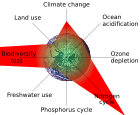Values Party
| Values Party | |
|---|---|
| File:Values Party of New Zealand logo.png | |
| Founded | June 1972 |
| Dissolved | 1990 |
| Succeeded by | Green Party |
| Ideology | Enviromentalism Green politics |
| Political position | Left-wing |
| Colours | Green |
| Politics of New Zealand Political parties Elections |
|
The Values Party, considered the world's first national-level environmentalist party, pre-dating any fashionable Green terminology, was established in May 1972 at Victoria University of Wellington, New Zealand. One of its initial leaders was Tony Brunt. Geoff Neill, the party's candidate in the Dunedin North electorate, became the Deputy Leader.[1]
Contents
Policies and beliefs
Several party manifestos sketched a progressive, semi-utopian blueprint for New Zealand's future as an egalitarian, ecologically sustainable society. The party appealed especially to those elements of the New Left who felt alienated both by the small Marxist-Leninist parties of the day, as well as by the bread-and-butter centre-left politics of the New Zealand Labour Party. The party is widely regarded[by whom?] as the first national political party promoting social renewal that incorporated restoring a respectful relationship to nature. From its beginning, the Values Party emphasised proposing alternative policies, rather than taking only an oppositionist stance to the ruling parties.[2]
Values Party policies included campaigns against nuclear power and armaments, advocating zero-population and -economic growth, abortion, drug and homosexual law-reform. Although the Values Party never sat in parliament, it drew considerable attention to these topics. Many political scientists[which?] credit the Values Party with making the environment a political issue, and with prompting other parties to formulate their own environmental policies.[citation needed]
Values Party contestation of elections
The Values Party contested five elections (1972, 1975, 1978, 1981 and 1984). Despite strong showings in 1975 and 1978 it did not gain seats under the first-past-the-post electoral system in use at that time. It did however manage to get some candidates elected to local government. The first, Helen Smith of Titahi Bay, joined the Porirua City Council in 1973.[citation needed]
Under the leadership of polytechnic economics lecturer Tony Kunowski, the Values Party contested the 1978 general election with a considerable following, but again failed to win seats in parliament. Most probably this was mainly because voters at that time were more concerned about rapidly rising unemployment than anything else. The idea of an ecological "zero-growth" society envisaged by Values Party members had met with the economic reality of near-zero GDP growth, high price-inflation, and an investment strike by business. Thus, a critical majority of voters preferred Rob Muldoon's National Party of New Zealand, which promised to create many more jobs by borrowing foreign funds to build large infrastructural projects (the so-called "Think Big" strategy, developing oil, gas, coal and electricity resources).[citation needed]
Electoral results (1972–1984)
| Election | candidates | seats won | votes | percentage |
|---|---|---|---|---|
| 1972 | 42 | 0 | 27,467 | 1.96 |
| 1975 | 87 | 0 | 83,241 | 5.19 |
| 1978 | 92 | 0 | 41,220 | 2.41 |
| 1981 | 17 | 0 | 3,460 | 0.19 |
| 1984 | 29 | 0 | 3,826 | 0.20 |
Downturn of the party
Subsequent to the demoralising election result, the Values Party faced internal conflict between the "red" greens and the "fundamentalist" Greens, and it fragmented amidst quarrels about organisational principles. Kunowski resigned as party leader[when?] in order to pursue a career as a banker.
In May 1990, however, remnants of the Values Party merged with a number of other environmentalist organizations to form the Green Party of Aotearoa New Zealand, which eventually did gain parliamentary seats. Many former members of the Values Party became active in the Green Party - notably Jeanette Fitzsimons, Rod Donald and Mike Ward.
References
- ↑ Lua error in package.lua at line 80: module 'strict' not found.
- ↑ Rosalie Steward. Politics in New Zealand from Beginning to Breakthrough, Synthesis/Regeneration 13 (Spring 1997).
External links
| Wikimedia Commons has media related to [[commons:Lua error in Module:WikidataIB at line 506: attempt to index field 'wikibase' (a nil value).|Lua error in Module:WikidataIB at line 506: attempt to index field 'wikibase' (a nil value).]]. |
- Pages with broken file links
- Articles with specifically marked weasel-worded phrases from February 2014
- All articles with specifically marked weasel-worded phrases
- Articles with unsourced statements from September 2014
- Vague or ambiguous time from February 2014
- Commons category link from Wikidata
- Political parties established in 1972
- Political parties disestablished in 1990
- Defunct political parties in New Zealand
- Green political parties in New Zealand
- 1972 in the environment
- 1972 establishments in New Zealand
- 1990 disestablishments in New Zealand
- Defunct green political parties
